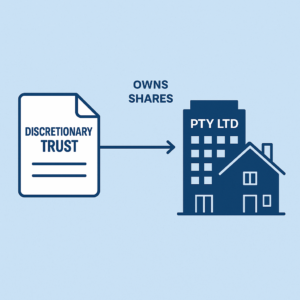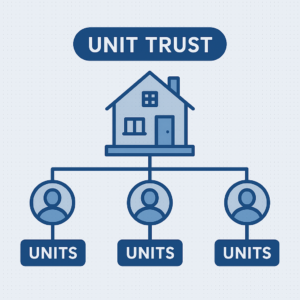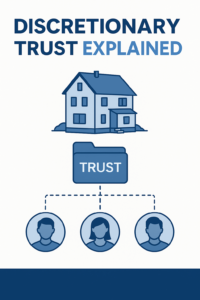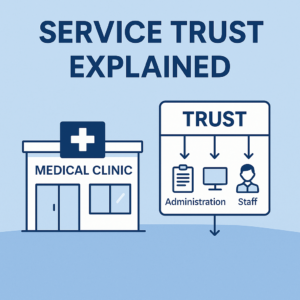Case Study 3: How a Tradie Uses a Discretionary Trust to Operate His Business
Meet Jake, a qualified tradesman who runs a plumbing business. Like many tradies, Jake initially operated as a sole trader. But as his business grew, so did the complexity of managing tax, protecting assets, and planning for the future. On advice from his accountant, Jake restructured his operations through a discretionary trust with a corporate trustee. This decision gave him a more effective, flexible, and protective way to run his business.

Step 1: Understanding Personal Services Income (PSI) Rules
Jake earns income primarily from his personal effort and skill—he performs plumbing services directly. As such, the PSI rules are relevant.
However, Jake ensures his business meets the results test, one of the four tests used by the ATO to determine whether a business qualifies as a Personal Services Business (PSB). By passing this test, Jake’s business is considered a PSB, which means:
- The PSI rules do not apply to the business.
- The income earned is treated as business income of the trust.
- The trust is allowed to distribute profits within legal and commercial boundaries.
This distinction is important—it means Jake can take advantage of the structural and tax benefits of operating through a trust.
Step 2: Paying a Market Salary and Generating Additional Business Income
The trust pays Jake a market salary for the plumbing services he performs. This ensures he receives a fair personal income that reflects what he would earn in a comparable job in the market.
In addition to his service income, the business also:
- Supplies plumbing tools and equipment,
- Sells accessories and parts at a margin.
These non-PSI revenue streams contribute to additional profit retained in the trust after Jake’s salary is paid.
Step 3: Distributing Business Profits Through the Trust
Since Jake operates via a discretionary trust, the remaining business profits (after his salary) can be distributed to beneficiaries at the trustee’s discretion, including:
- Family Members
- Family members who are named or eligible beneficiaries under the trust deed can receive distributions, even if they do not work in the business.
- Distributions to adult beneficiaries are taxed at their personal marginal rates.
- Distributions to minors may attract penalty tax rates under Division 6AA, with limited exceptions.
This flexibility allows the trust to minimise the overall family tax burden by distributing income to those in lower tax brackets, where appropriate.
Bucket Company
If there are no family members to distribute to—or if it is tax-efficient to do so—the trust can distribute profits to a bucket company.
A bucket company typically pays tax at the corporate rate (25% or 30% depending on eligibility).
The funds can be retained in the company until needed, deferring further personal tax until dividends are paid.
Step 4: Asset Protection
One of the major non-tax benefits of operating through a discretionary trust is asset protection:
Business assets, including tools and equipment, are owned by the trust, not by Jake personally.
This means that creditors of Jake personally cannot access trust-owned business assets, provided proper separation is maintained.
However, it’s critical to note: only assets inside the trust are protected. Jake’s personal assets (e.g. home, car, personal savings) remain exposed unless further asset protection strategies are in place.
Step 5: Succession Planning and Future Control
Using a trust also provides long-term planning flexibility. If Jake wants to pass the business on to his children, he can do so by:
- Changing the appointor and positions in the trustee company, which transfers control of the trust (and therefore the business).
- This can typically be done without triggering Capital Gains Tax (CGT) or stamp duty, as long as there is no change in beneficial ownership of the trust assets.
- This makes succession planning much smoother and more tax-effective than transferring a sole trader business or company shares directly.
Summary
Jake’s case shows how a tradie can use a discretionary trust to effectively:
- Comply with PSI rules by operating as a PSB,
- Pay himself a fair market salary,
- Distribute surplus profits to family members or a bucket company,
- Protect business assets from personal liabilities,
- Enable flexible and tax-effective succession planning.
- This structure not only enhances day-to-day tax efficiency but also provides longer-term security and flexibility.
Disclaimer
This blog provides general information only and does not constitute personal tax, legal or financial advice. You should consult a qualified professional advisor to assess how any strategies apply to your specific circumstances before acting on this information.
Others
-
October 20, 2025 Buying Property Under Your Personal Name in Australia: Pros and Cons
-
October 18, 2025 Service Trust Business Structure in Australia




